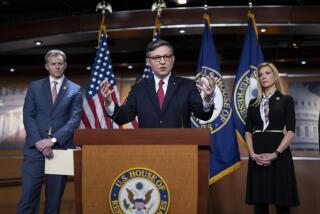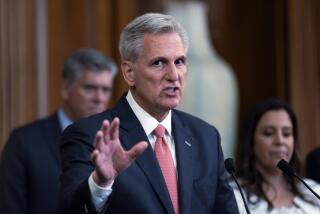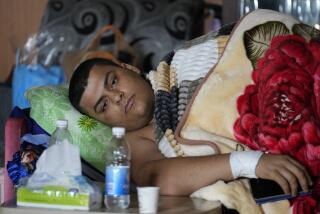Iraq legislators delay break in search of an election bill
BAGHDAD — The Iraqi parliament voted Tuesday to postpone its summer recess for 30 days, in a bid to finalize legislation needed to hold provincial elections in the fall.
U.S. and Iraqi officials hope that the poll scheduled for Oct. 1 will settle local power disputes that threaten to undermine security gains since last summer. But parliament is divided over the procedures to be followed.
U.S. officials have criticized Iraqi lawmakers for taking long summer vacations while key legislation was pending.
The decision to delay the recess came as Sunni Arab lawmakers said they were nearing an agreement with Prime Minister Nouri Maliki that would bring them back into the Cabinet. Their return to a government dominated by Shiite Muslims and ethnic Kurds is considered a key part of reconciliation efforts.
United Nations envoy Staffan de Mistura warned leaders of parliament at a meeting Tuesday that the country wouldn’t be ready to vote by the beginning of October because of the delay in approving a new election law. If the bill isn’t finalized this month, it might not be possible to hold the elections this year, he told reporters afterward.
Legislators had been scheduled to go on holiday Tuesday, but agreed to continue meeting until July 30 to try to resolve their differences over the elections, said Jaber Habeeb of the governing Shiite alliance.
Lingering disputes include whether candidates should compete individually or on party lists, and whether political groups that have militias should be able to participate.
Passage of an election bill has also been held up by arguments over whether to postpone voting in Kirkuk until a decision is reached about the future of the oil-rich city and other areas claimed by Iraq’s semiautonomous Kurdish region in the north.
Most Sunni Arabs boycotted the last provincial polls in 2005, skewing the results in ethnically and religiously mixed parts of the country. They are expected to participate in the next round of voting. But inter-Sunni disputes over who best represents predominantly Sunni areas have emerged between the traditional political parties and the tribal chieftains who helped drive out militant groups.
In the overwhelmingly Shiite south, followers of populist cleric Muqtada Sadr also are angling for more influence after largely staying out of the 2005 elections. The proposal to bar parties with militias is believed to be aimed at the cleric’s movement, which sidestepped the issue by announcing that it would endorse individual candidates but would not field its own list.
Separately, the largest Sunni alliance pulled its representatives out of Maliki’s government in August, accusing the main Shiite factions of refusing to share power.
But members of the Iraqi Accordance Front say the government has met some of their key demands, including approving a conditional amnesty aimed at reducing the number of mostly Sunni detainees held in Iraqi jails.
The Sunni alliance has also expressed approval of recent government crackdowns against Shiite militants in Basra, Amarah and parts of Baghdad. Sunni politicians had accused Maliki of failing to go after fellow Shiites as aggressively as he pursues Sunni insurgents.
Salim Abdullah Jabouri, spokesman for the Sunni alliance, said Maliki had agreed to give the Sunnis six ministries and a deputy prime minister’s slot. The ministries would be those of culture, higher education, women’s affairs, and planning; the ministry of state for foreign affairs; and one other portfolio, still to be determined, Jabouri said.
Lawmakers have said before that a deal was imminent -- only for disputes to break out over the details.
The most contentious position is the Planning Ministry, which is held by Ali Baban, a Sunni who broke with the alliance to stay in the job. Jabouri said Baban would remain for now but could be replaced.
In violence Tuesday, police said that at least seven people were killed in a series of attacks in Diyala province. The incidents included a roadside bombing, which injured a man and killed his three sons as they drove through farmland south of Baqubah, the provincial capital.
Periodic attacks have persisted in Diyala despite U.S. offensives last year to clear the ethnically and religiously mixed province of Sunni militants loyal to Al Qaeda in Iraq and other militant groups. Maliki has promised his own offensive to finish the job.
North of Diyala, a truck bomb targeting a Sunni tribal chief’s residence in Gayarah killed one person and injured at least 25 others, police said. The sheik, who was among the wounded, is one of those who turned against Al Qaeda in Iraq in the district about 45 miles south of Mosul.
The number of attacks nationwide has dropped to its lowest level since 2004, according to figures compiled by the U.S. military. But U.S. officers warn that militants remain capable of deadly strikes.
--
Times staff writers Saif Hameed, Raheem Salman and Said Rifai and special correspondents in Baghdad and Mosul contributed to this report.
More to Read
Sign up for Essential California
The most important California stories and recommendations in your inbox every morning.
You may occasionally receive promotional content from the Los Angeles Times.










